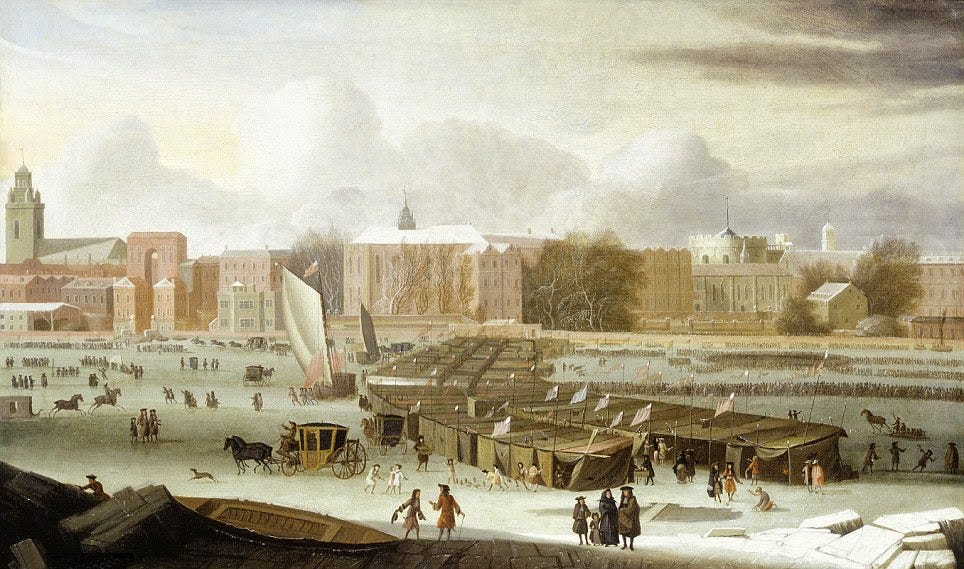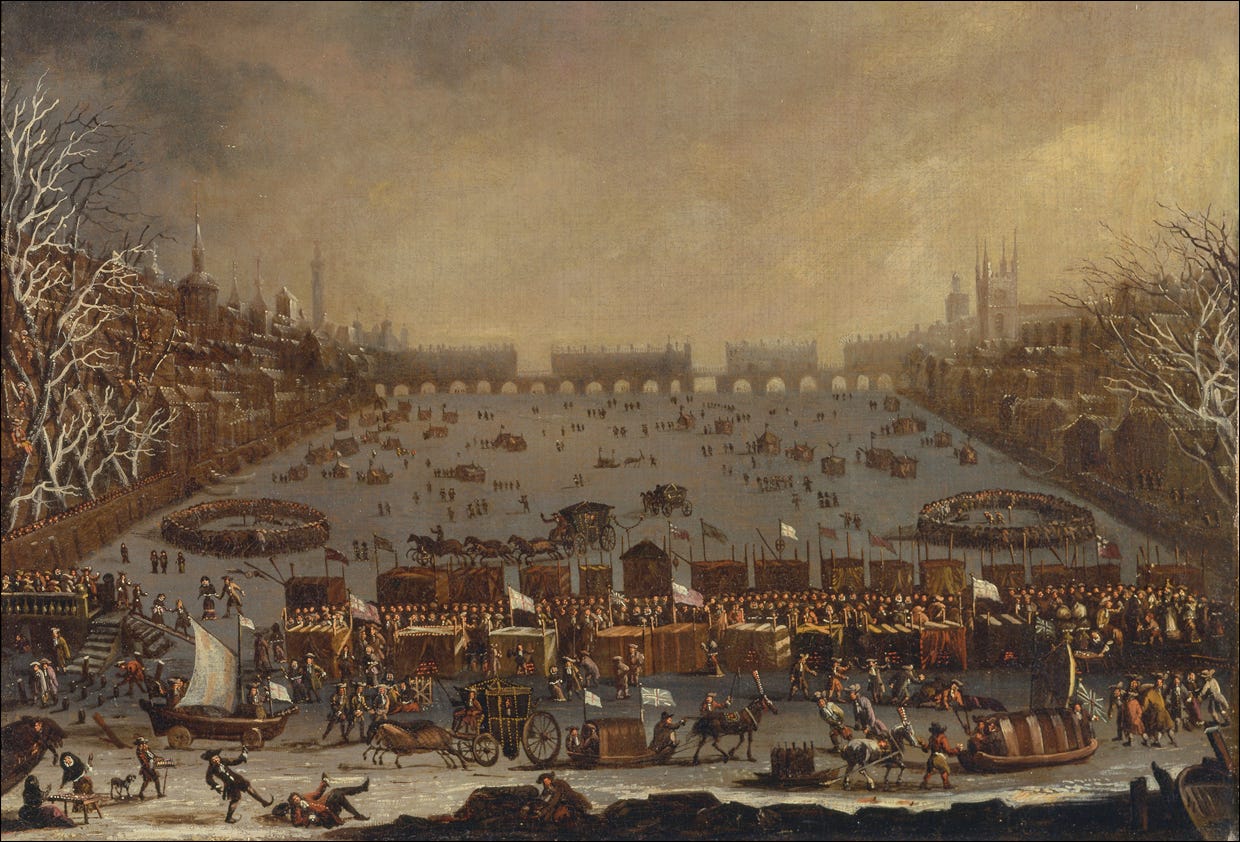(Hello, this is Histories, a free weekly email exploring first-hand accounts from the corners of history… Do please share this with fellow history fans!)
Coaches plied from Westminster to the Temple, and from several other stairs to and fro, as in the streets, sleds, sliding with skates, a bull-baiting, horse and coach-races, puppet-plays and interludes…
This week my nine-year-old has been enjoying stomping in the frozen puddles – but entire frozen lakes and rivers, in the UK at least, seem to be a thing of the past. From medieval times until the early/mid-19th century, Britain had what’s referred to as the ‘Little Ice Age’, which is reflected in many charming paintings and accounts of wintry scenes in centuries past.
A particular feature of this era were the ‘frost fairs’ on the River Thames, and we have accounts of them from the 17th to 19th centuries – although there are possible references to social activities in the ice as far back as Saxon times, and in 1410, the Chronicle of the Grey Friars of London recorded: ‘And this yere was the grete frost and ise and the most sharpest wenter that ever man sawe, and it duryd fourteen wekes, so that men myght in dyvers places both goo and ryde over the Temse.’ Raphael Holinshed’s Chronicle notes that on 21 December 1564, there ‘began a frost, which continued so extremely that on new year’s eve people went over and along the Thames on the ice from London Bridge to Westminster. Some played at the foot-ball as boldly there as if it had been on the dry land’. The Thames then was wider and more sluggish, until London Bridge was rebuilt in the 19th century.
It wasn’t just in London, of course, that these frosts, fairs and football games happened. In 1736 the York historian Francis Drake wrote that in 1607, ‘the river Ouze was wholly frozen up, so hard that you might have passed with cart and carriage as well as upon firm ground. Many sports were practised upon the ice, as shooting at eleven score, says my ancient authority, bowling, playing at football, cudgels, &c.’ And in 1641, a religious pamphlet on ‘God’s judgements’ by Henry Burton and William Prynne, was slightly too eager to record this: ‘On January the 25th, 1634, being the Lord’s Day, in the time of the last great frost, fourteen young men, presuming to play at football on the river Trent, near Gainsborough, coming altogether in a scuffle, the ice suddenly broke, and there were eight of them drowned.’
The Thames sticks most in the popular imagination, however, and there are some wonderful contemporary illustrations of the frost fairs, in pictures and words. In 1608, John Chamberlain (whose letters we can return to another time) wrote a letter to Sir Dudley Carleton, later the Secretary of State: ‘Above Westminster the Thames is quite frozen over and the Archbishop came from Lambeth on Twelfth Day over the ice to the court. Many fantasticall experiments are dayly put in practise as certain youths burnt a gallon of wine upon the ice and made all the passengers partakers. But the best is of an honest woman (they say) that had a great longing to have her husband get her with child upon the Thames.’
There were numerous broadsides and ballads written to mark the freezes, particularly that of 1683–4. Perhaps the best account of that season’s freeze was recorded by the diarist and courtier John Evelyn (1620–1706). He had already written about the one back in 1662: ‘1st December. Having seen the strange and wonderful dexterity of the sliders on the new canal in St. James’s Park, performed before their Majesties by divers gentlemen and others with skates, after the manner of the Hollanders, with what swiftness they pass, how suddenly they stop in full career upon the ice; I went home by water, but not without exceeding difficulty, the Thames being frozen, great flakes of ice encompassing our boat.’ And here is his full account from 1684:
9th January
I went across the Thames on the ice, now become so thick as to bear not only streets of booths, in which they roasted meat, and had divers shops of wares, quite across as in a town, but coaches, carts, and horses passed over. So I went from Westminster stairs to Lambeth, and dined with the Archbishop: where I met my Lord Bruce, Sir George Wheeler, Colonel Cooke, and several divines. After dinner and discourse with his Grace till evening prayers, Sir George Wheeler and I walked over the ice from Lambeth stairs to the Horse-ferry.
16th January
The Thames was filled with people and tents selling all sorts of wares as in the city.
24th January
The frost continues more and more severe, the Thames before London was still planted with booths in formal streets, all sorts of trades and shops furnished, and full of commodities, even to a printing press, where the people and ladies took a fancy to have their names printed, and the day and year set down when printed on the Thames: this humor took so universally, that it was estimated that the printer gained £5 a day, for printing a line only, at sixpence a name, besides what he got by ballads, etc. Coaches plied from Westminster to the Temple, and from several other stairs to and fro, as in the streets, sleds, sliding with skates, a bull-baiting, horse and coach-races, puppet-plays and interludes, cooks, tippling, and other lewd places, so that it seemed to be a bacchanalian triumph, or carnival on the water, while it was a severe judgment on the land, the trees not only splitting as if the lightning struck, but men and cattle perishing in divers places, and the very seas so locked up with ice, that no vessels could stir out or come in. The fowls, fish, and birds, and all our exotic plants and greens, universally perishing. Many parks of deer were destroyed, and all sorts of fuel so dear, that there were great contributions to preserve the poor alive. Nor was this severe weather much less intense in most parts of Europe, even as far as Spain and the most southern tracts. London, by reason of the excessive coldness of the air hindering the ascent of the smoke, was so filled with the fuliginous steam of the sea-coal, that hardly could one see across the street, and this filling the lungs with its gross particles, exceedingly obstructed the breast, so as one could scarcely breathe. Here was no water to be had from the pipes and engines, nor could the brewers and divers other tradesmen work, and every moment was full of disastrous accidents.
4th February
[Evelyn was a keen gardener, known for his expertise on fruit and trees in particular. Sayes Court was his house in Deptford, near the Thames.]
I went to Sayes Court to see how the frost had dealt with my garden, where I found many of the greens and rare plants utterly destroyed. The oranges and myrtles very sick, the rosemary and laurels dead to all appearance, but the cypress likely to endure it.
5th February
It began to thaw, but froze again. My coach crossed from Lambeth, to the Horse-ferry at Milbank, Westminster. The booths were almost all taken down; but there was first a map or landscape cut in copper representing all the manner of the camp, and the several actions, sports, and pastimes thereon, in memory of so signal a frost.
There are many later accounts of the frost fairs, too, most notably those recorded in Frostiana, or a History of the River Thames in a Frozen State, ‘Printed and published on the ice on the River Thames’ on 5 February 1814, and Famous Frosts and Frost Fairs by William Andrews (1887).
Next week: Dieting, Victorian-style…




